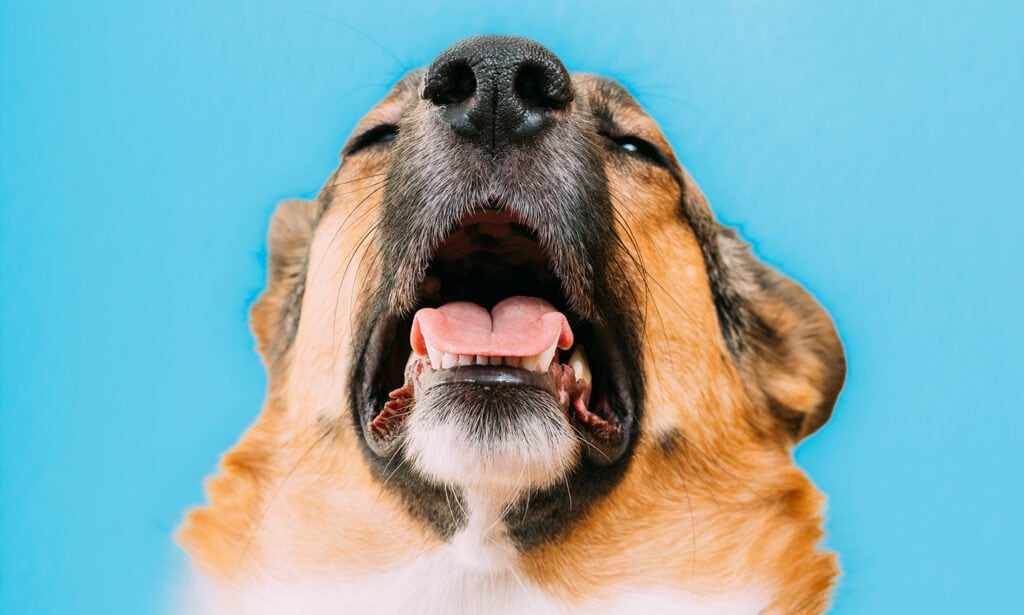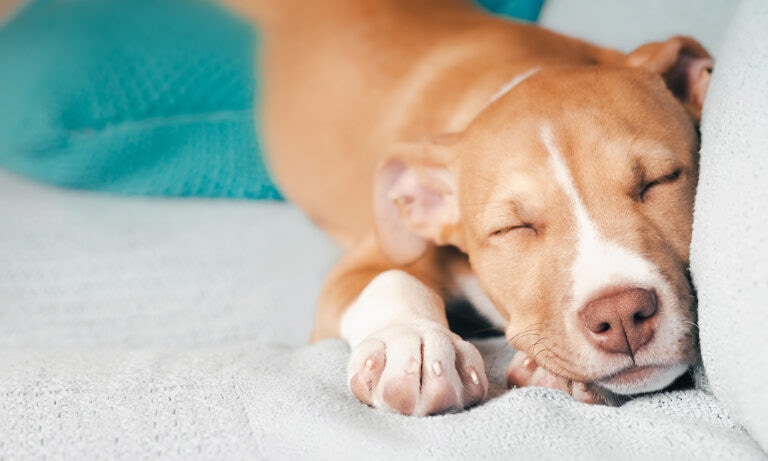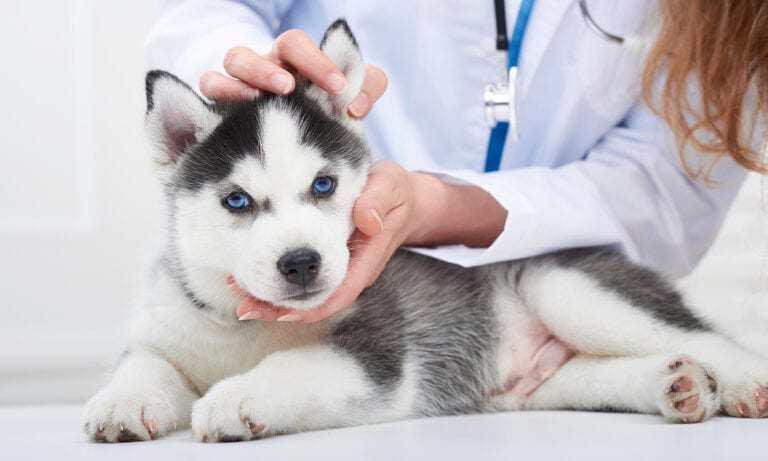Have you noticed your canine companion or feline friend coughing or sneezing? If so, they might have kennel cough. Kennel cough in dogs and cats is similar to the common cold for us humans. There are various causes, strains and symptoms—plus, it can (unfortunately) be contracted multiple times.
As pet parents, we want nothing more than to help ensure our beloved pets are happy and healthy. We spoke with veterinary experts to learn more about what kennel cough is; signs to watch for; plus, treatment and prevention.
In This Guide:
What Is Kennel Cough in Dogs and Cats?
Kennel cough is a highly contagious respiratory disease, says Bethany Hsia, DVM, co-founder of CodaPet in Clovis, California.
Also known as infectious tracheobronchitis and canine infectious respiratory disease complex (CIRDC), kennel cough is characterized by inflammation of the upper respiratory tract, which often includes the trachea and bronchi. This, Dr. Hsia explains, is usually caused by a combination of viruses and bacteria—with the most common culprits being the canine parainfluenza virus and Bordetella bronchiseptica bacteria. Others include canine adenovirus type 2, canine herpes virus and mycoplasma.
And while kennel cough primarily affects dogs, cats can also contract a form of kennel cough, says Sabrina Kong, DVM, certified canine rehabilitation practitioner at Jules Veterinary Center in Tracy, California, and veterinary consultant at WeLoveDoodles.com. Although it's less commonly referred to by that name, the condition is often called Bordetella, or feline bordetellosis in cats, she adds.
Kennel cough can sound scary—both as an illness and upon hearing a pet with symptoms. However, it’s generally a mild condition that can cause some discomfort in pets, explains Nicole Savageau, VMD, an Austin, Texas-based veterinarian with the national mobile pet care service The Vets. In healthy dogs and cats, she says it often resolves on its own within a few weeks. Pets who are more susceptible to several complications of kennel cough, like pneumonia, include puppies, older dogs or those with underlying health conditions.
If you notice your dog or cat showing respiratory symptoms, it’s always a good idea to consult a veterinarian.
How Do Pets Get Kennel Cough?
Considering how contagious kennel cough is, there are a few ways it can spread from one pet to another.
“Several different pathogens can cause kennel cough, but Bordetella bronchiseptica is one of the most common and can infect both dogs and cats,” Dr. Kong says.
She adds that transmission typically occurs through airborne droplets when an infected animal coughs or sneezes, or through direct contact with contaminated surfaces (e.g., food bowls, water bowls, toys, furniture, floors).
Our experts say pets can contract kennel cough in high-risk areas where many dogs or cats are close together, such as:
- Pet boarding facilities
- Doggy daycare
- Boarding kennels
- Dog parks
- Animal shelters
- Public sidewalks
Pets of any age or breed can be infected with kennel cough.
Is Kennel Cough Contagious?
“Kennel cough is highly contagious among dogs but is generally not transmissible to humans,” Dr. Savageau says. “However, it’s possible for humans to carry the pathogens on their clothes or skin, potentially spreading it to other dogs.”
According to the American Veterinary Medical Association (AVMA), cases of dog-to-human transmission are extremely rare. That's because only one CIRDC-associated organism, Bordetella bronchiseptica, is known to infect people.
As for cross-species transmission to cats, this is rare, according to Dr. Savageau. Even so, she recommends taking precautions, such as washing hands and changing clothes after contact with infected animals, to prevent a potential spread.
Signs of Kennel Cough
Our experts recommend watching for the following symptoms of kennel cough in dogs and cats:
- Persistent, dry, hacking cough (dogs may make goose honking sounds)
- Sneezing
- Retching
- Gagging
- Runny eyes (eye discharge)
- Runny nose (nasal discharge)
- Mild fever
- Lethargy
- Loss of appetite
- Difficulty resting (due to frequent coughing fits)
While clinical signs are similar in both dogs and cats, Dr. Kong says they can vary slightly.
“In cats and dogs, the severity of the symptoms can vary depending on the individual animal's health and the specific pathogens involved,” she says.
Dr. Savageau notes that symptoms typically last two to three weeks but can remain for up to one month.
If you suspect your pet has kennel cough, or a similar respiratory illness like dog flu (canine influenza) or canine distemper virus, Dr. Hsia recommends scheduling an appointment with your vet for an accurate diagnosis.
Kennel Cough Treatment
Much like a human cold, there isn’t a specific treatment for kennel cough. However, Dr. Hsia says treatment typically involves a combination of:
- Rest
- Supportive care (e.g., humidity, proper nutrition and hydration)
- Medication (e.g., cough suppressants, or antibiotics in severe or prolonged cases)
As your pet is recovering from kennel cough, it’s best that they avoid strenuous exercise, Dr. Hsia says.
The Merck Veterinary Manual states that stress, plus extremes of ventilation, temperature and humidity can play a role in increasing the susceptibility to and severity of kennel cough.
“While there are some home remedies that pet parents may consider for mild cases of kennel cough, it’s essential to consult with a veterinarian before trying any home treatments,” Dr. Hsia says. “Some safe home remedies that may help include using a humidifier to ease respiratory discomfort.”
As your dog or cat rests and recovers, you can help them feel even more comfortable by providing them with extra care and cuddles.
How To Prevent Kennel Cough in Dogs and Cats
Kennel cough can be prevented in dogs and cats. Here’s how.
Vaccinate your pet.
Dr. Hsia recommends taking your dog or cat in for the Bordetella vaccination. For dogs, there are combination vaccines that protect against Bordetella, parainfluenza, and sometimes adenovirus type 2, all of which can cause upper respiratory infections. Although it’s not 100 percent effective, this is the best way to prevent kennel cough in pets. This is especially important if your pet is around other animals often—but also because of how easy it can be to catch it simply from going out for a walk around the neighborhood.
For dogs, the first vaccination is recommended at 6–8 weeks old. When a dog receives their booster shot depends on if they received an injectable (SQ) Bordetella vaccine or an intranasal or oral dose. According to the American Animal Hospital Association (AAHA) canine vaccine guidelines, the first time a dog receives an injectable (SQ) Bordetella vaccine, they should receive a booster two to four weeks later. If they received an intranasal or oral dose, they may not need a booster for six to 12 months, depending on their lifestyle risks. Dogs who receive the DA2PP (Distemper, Adenovirus, Parvo, Parainfluenza) should get their booster shot every three to four weeks until they’re at least 16 weeks old.
Healthy kittens can get the vaccination once they’ve reached 8 weeks old, according to Merck.
Avoid or be cautious in crowded pet areas.
While it’s impossible to avoid high-traffic places like veterinary hospitals and public sidewalks, Dr. Hsia suggests minimizing or avoiding crowded places where infection can easily be spread, such as pet boarding facilities or dog parks. If your pet has been diagnosed with kennel cough, or you suspect they could have an infectious respiratory infection, keep them at home isolated from other pets while they are symptomatic.
FAQs About Kennel Cough
Q:
Can humans catch kennel cough?
Q:
Can kennel cough go away by itself?
Q:
What is the fastest way to cure kennel cough?
Q:
Is there a kennel cough vaccine?
Q:
How long does kennel cough last in dogs?
More about caring for your pet:
Share:











